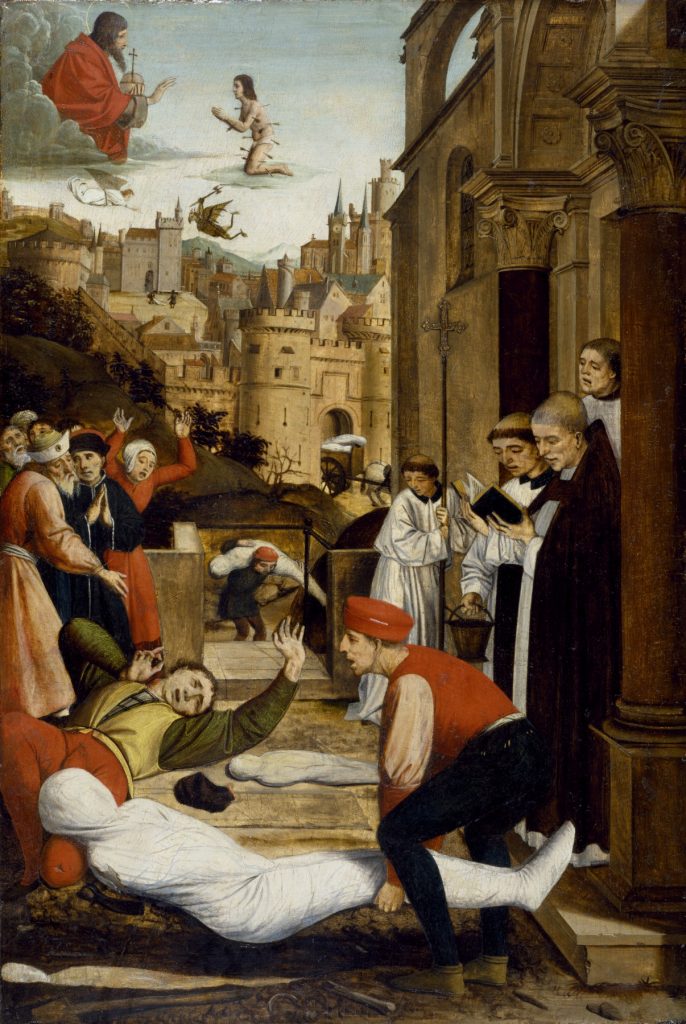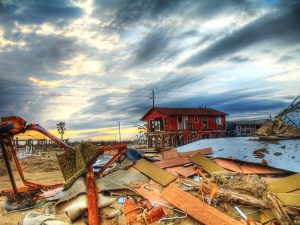There have been many epidemics that have plagued our planet over the last few thousand years; some, however, were more devastating than others. Epidemics often cause major disruptions in a society, besides simply killing people. They affect the amount of people in the workforce, which in turn can disrupt the production of goods and the food supply needed for a society.
The famous Bubonic Plague killed around a third of the population of Europe in the 1300s. The population of Europe in 1340 was about 73.5 million, and the plague affected over 20 million people. Today, Europe’s population is 508,450,856, meaning that if the plague were to have the same effects today as it did in the 1300s, it would kill around 102,000,000 people!1

The Bubonic Plague originated in the fleas carried by rodents like rats, squirrels, and prairie dogs, which transmitted the disease from one to the other. The disease spread from southwestern China to eventually the Black Sea ports of Caffa and Tana by 1346, and by 1348 it had reached northern Europe.2 The disease caused about the same symptoms in all of its victims, such as a fever, and pain so strong that they were not able to keep down any food. The name of this disease came from the fact that the people would become covered in black boils that oozed puss and blood.3 The photograph to the right is an exhibit at the Eyam Museum showing what an infected person would have looked like. The disease was highly contagious and was deadly because it worked so quickly; its victims could have been healthy one day and gone the next.

This image is of a doctor’s mask, which is similar to the masks that doctors used during the plague. These masks were believed to have protected them from breathing in the infected air. However, the masks were not very effective since many doctors contracted the disease.
This epidemic did not affect European countries in just one way, it caused major problems in many aspects of life for many areas. The continent had been battling famine and food shortages before the plague struck; then afterwards it left them in an even more compromising situation. There was a shortage of workers in the workforce, which meant that all aspects of production were affected, from food to goods and services. Try to imagine one third of the people you connect with on a regular basis completely gone. That would be a third of all the doctors, the workers you’ve encountered at the grocery store, a third of all the teachers, and even a third of one’s entire family. While this is happening, one’s entire country might already be going through a devastating famine. It is incredible that Europe was able to recover from this disaster and now has one of the largest populations in the world. The continent was able to recover from losing over a third of its population, in one of the most notorious epidemics in our world’s history, and now thrives as a largely populated and diverse part of the world.
- Josiah C. Russell, The Fontana Economic History of Europe, Vol. I: The Middle Ages, “Population in Europe,” (HarperCollins Distribution Services, 1972); European Union, “Living in the EU,” Europa.eu. (accessed November 2, 2016), http://europa.eu/european-union/about-eu/figures/living_en#tab-1-3. ↵
- Jerry H. Bentley, Herbert F. Ziegler, and Heather E. Streets-Salter, Traditions and Encounters: A Brief Global History Volume 1. 4th ed. Vol. 1. (McGraw Hill Education, 2016), 333-336. ↵
- McClain, Charles. “Of Medicine, Race, and American Law: The Bubonic Plague Outbreak of 1900,” Law & Social Inquiry 13, no. 3 (1988): 447-513. ↵



58 comments
Madeline Emke
This was an extremely well-written and informative article. I read this while we are in the middle of the Covid-19 pandemic, and it is interesting to note some of the correlations between the Bubonic Plague and the coronavirus. Even though the death rate is much lower, the economic impact of both epidemics is scarily similar because of the lack of people in the workforce and the slowing of the production of goods and services.
Jesus Parker
The Bubonic Plague is an epidemic so important and severe that people will not forget anytime soon. A plague such as the Bubonic plague would be unthinkable if it were to happen today. So many people lost their lives in such a horrible and fast way. Just imagine what was going on in their mind when they realized they have contacted the plague.
Breanna Perry
What a well written article. The author did a good job at modernizing the topic. It still seems unreal that a disease wiped out a third of the population of quite a large country in a short period of time. I also can not believe that Europe was able to recover from it so well and become the country it is now. I can’t imagine anything like that happening to America now, and I really hope it does not!
Lauren Keller
It seems bizarre in this day and age to think that a disease has the possibility to cause an epidemic this big, and kill so many people in the process. I’m glad that with the help of technology and medicine, vaccines have been able to prevent epidemics like this from starting again. However, I am glad that Europe was able to recover from this and now have one of the largest populations in the world. I can hardly imagine what losing a third of the population could do to the workforce, family life, and overall community morale.
Abigale Carney
This was such a well written article! I really appreciate your efforts to modernize this topic in ways that the reader would be able to recognize the stats of this horrible plague in our time. I just read the article discussing the black plague, and reading these articles horrify me and make me wish we were able to provide help and resources to those effected by this plague. I am so grateful for today’s technology and research because it is vital to be able to prevent and diminish diseases to this measure in order to have a functioning society.
Makenzie Santana
It’s sad to think about old time diseases and sicknesses like this, and the type of effect it had on people. I am a little curious as to how these diseases that weren’t uncommon are non existent in the world today. It could be the medicine, technology, environmental changes, who knows. It is a scary thought that if plagues were still a common occurrence and the type of effect it would have on today’s world like it did back then.
Eric Ortega Rodriguez
This is a very interesting article. I am pretty sure that at some point or another we have read our discussed the Bubonic Plague in one or more of our classes. The author does an excellent job of introducing the topic. By providing the statistics in more “modern” time allows the audience to be more captivated. Overall, this was a very well written article with an original topic selection. Great work.
Samantha Ruvalcaba
Reading about the Bubonic Plague always makes me saddened for the people that lost their lives in some way and were affected by it in such a way. I like how at the beginning of the article, you add an estimate of what the numbers might have been today compared to back then. I added more perspective and understanding of just how impactful it was.
Antonio Coffee
The bubonic plague is insane to think about. The amount of devastation it caused was tremendous and it really impacted the world. It is hard to imagine what the world would be like if the bubonic plague had not happened. The population in Europe would have been much higher and there would have been less concern about disease. This could have lead to many things that would shape the world in different ways and the course of history may have played out completely different.
Vanessa Sanchez
This article is very informative and factual, it crazy how when the world starts to get better there will always be something that takes you one step back. This time was emotional, and economically a terrible situation. This terrible disease wipe out one third of the world gets wiped out by a disease brought on by rats.